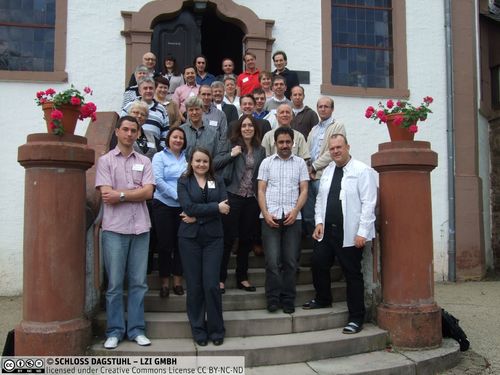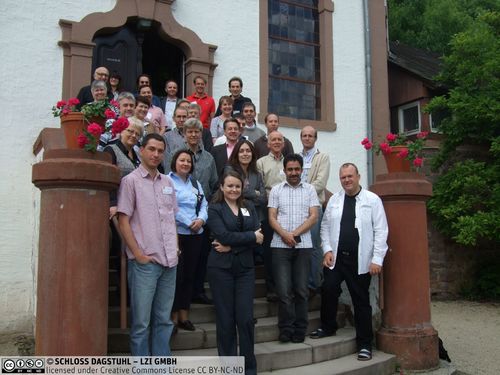Dagstuhl-Seminar 12231
Future Internet for eHealth
( 03. Jun – 06. Jun, 2012 )
Permalink
Organisatoren
- Paolo Bonato (Harvard Medical School - Boston, US)
- Markus Fiedler (Blekinge Institute of Technology - Karlskrona, SE)
- David Hausheer (TU Darmstadt, DE)
- Katarzyna Wac (University of Geneva, CH)
Kontakt
- Simone Schilke (für administrative Fragen)
Presse/News
Programm
Press Release
Press Reviews
- Können Computerspiele unsere Gesundheit fördern?
Saarbrücker Zeitung am 2./3.06.2012
The paradox of life in the 21st century is that while advancements in technology and medicine enable us to live longer, our lifestyle choices increase the probability of becoming chronically ill earlier in our life and experience long-term limitations, requiring long-term social support. In 2005, 78% of European medical care spending was on chronic disease management, while 86% of deaths were due to such a disease. Yet, current health systems are designed for an acute cure rather than for a chronic care, leading to a continuous increase in healthcare costs. To achieve economically sustainable and affordable healthcare system, efficient and effective solutions are needed integrating technological advancements, and empowering the patients for better self-management, as well as healthcare teams for better decisions.
Recently, multiple initiatives have been established to shape the Internet of the future, supporting key application sectors such as healthcare, transportation, and energy, amongst others. At the same time, the emergence of next generation high bandwidth public wireless networks and miniaturized personal mobile devices have given rise to new mobile healthcare (mHealth) services. For example, highly customizable vital sign tele-monitoring of chronically ill patients can be provided based on body area networks (BAN) and mHealth applications. Such applications enable live-transmission of the data to healthcare providers, and real-time feedback to the patient, enabling her to self-manage her disease and health, respectively. Additionally, elderly people can benefit from applications that help them to stay in contact with their care teams, which are provided with valuable hints on the state of the elderly, thus in the long run facilitating economically sustainable care combined with an improved quality of life.
However, such applications do not emerge by themselves, but need to be carefully designed to support in an evolutionary way the existing healthcare workflows, fulfilling their duties at the given quality level and cost. Such a task can only be tackled in a multi-disciplinary way as it was a goal of this seminar; experts from healthcare, elderly care, insurance experts, together with experts from domains such as human-computer interaction, interactive application design, telecommunications, networking and economy teamed up to understand and support each other in designing and deploying future-proof eHealth services and applications based on Future Internet technology.
At large, the seminar addresses the following questions:
- Which will be the key eHealth applications and services in the Future Internet?
- Which are current and future quality requirements of eHealth applications and services?
- Which business models are viable for future eHealth applications?
- Which methodological support is required to design economically sustainable network-supported eHealth services?
Question 1 teamed up the participants around relevant use cases and facilitated discussions on the technical question 2 and the economical question 3, respectively. Question 4 addressed research needs from different domains and fertilized corresponding activities for advancing the topic of Future Internet for eHealth.
- Albert Alonso (Hospital Clinic de Barcelona - Barcelona, ES) [dblp]
- Gerald Bieber (FhG IGD - Rostock, DE) [dblp]
- Doris M. Bohman (Blekinge Institute of Technology - Karlskrona, SE)
- Paolo Bonato (Harvard Medical School - Boston, US)
- Sara Eriksén (Blekinge Institute of Technology - Karlskrona, SE) [dblp]
- Markus Fiedler (Blekinge Institute of Technology - Karlskrona, SE) [dblp]
- Geraldine Fitzpatrick (TU Wien, AT) [dblp]
- Caroline Franck (Hôpitaux Universitaires - Genève, CH)
- Stefan Göbel (TU Darmstadt, DE) [dblp]
- Nick Guldemond (TU Delft, NL)
- Mattia Gustarini (University of Geneva, CH)
- Jody Hausmann (University of Geneva, CH)
- Rainer Herzog (Unify - München, DE)
- Hannes Kaufmann (TU Wien, AT)
- Zviad Kirtava (Tbilisi State Medical University, GE)
- Willy Kostucki (Clinique Antoine Depage - Brussels, BE)
- Ernoe Kovacs (NEC Laboratories Europe - Heidelberg, DE)
- Lenka Lhotská (Czech Technical University, CZ)
- Maria Martini (Kingston University - Kingston upon Thames, GB) [dblp]
- Goran Martinovic (University of Osijek, HR)
- Dave Marvit (Fujitsu Labs of America Inc. - Sunnyvale, US)
- Kevin Patrick (UC - San Diego, US) [dblp]
- Terje Peetso (European Coomission - Brussels, BE)
- Pawel Swiatek (Wroclaw University of Technology, PL)
- Halina Tarasiuk (Warsaw University of Technology, PL)
- Vicente Traver Salcedo (Universidad Politécnica - Valencia, ES)
- Muhammad Ullah (Blekinge Institute of Technology - Karlskrona, SE)
- Marc van Anderlecht (Uni-Com Medical - Brussels, BE)
- Katarzyna Wac (University of Geneva, CH) [dblp]
Klassifikation
- mobile computing
- networks
- society / human-computer interaction
Schlagworte
- Future Internet
- mobile computing
- wireless networking
- eHealth
- chronic care management



